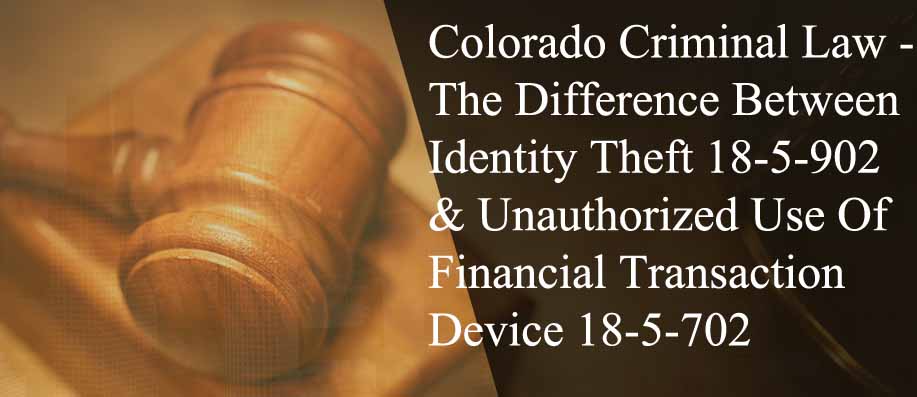




Aug 26
Colorado Criminal Law – The Difference Between Identity Theft 18-5-902 & Unauthorized Use Of A Financial Transaction Device 18-5-702

Colorado Criminal Law – The Difference Between Identity Theft 18-5-902 & Unauthorized Use Of A Financial Transaction Device 18-5-702
By H. Michael Steinberg Colorado Theft Crimes Criminal Defense Lawyer
Colorado Criminal Law – The Difference Between Identity Theft 18-5-902 & Unauthorized Use Of A Financial Transaction Device 18-5-902 – Sometimes the difference between a more serious felony theft charge and a misdemeanor theft charge turns on a single element of difference. That is the case for these two laws.
At first glance he two laws appear to punish the same conduct.
Under Colorado Constitutional law – a person cannot be prosecuted by a more serious crime if the law punishes identical conduct of another Colorado criminal law.
Here is the rule as stated by the Colorado Court of Appeals:
It is only when the same conduct is proscribed in two statutes, and different criminal sanctions apply, that problems arise under equal protection.
When Colorado Theft Crimes Appear The Same – But Are Different
Colorado crimes must be distinguishable from one another AND those differences must be ” both real in fact and reasonably related to the general purposes of the criminal legislation.” Laws can be created establishing more “severe penalties for acts that it believes have graver consequences, even if the differences are only a matter of degree.”
Colorado ‘s Identity Theft Law 18-5-902
In a recent Colorado case addressing this important issue -the accused was charged with using the credit card of another without her permission to purchase food, clothing, and similar items.
In analyzing the two laws – the Court found an important – but subtle distinction.
Here is a complete reprint of the two Colorado Title 9 fraud laws in question:
§ 18-5-902. Identity Theft.
(1) A person commits identity theft if he or she:
(a) Knowingly uses the personal identifying information, financial identifying information, or financial device of another without permission or lawful authority with the intent to obtain cash, credit, property, services, or any other thing of value or to make a financial payment;
(b) Knowingly possesses the personal identifying information, financial identifying information, or financial device of another without permission or lawful authority, with the intent to use or to aid or permit some other person to use such information or device to obtain cash, credit, property, services, or any other thing of value or to make a financial payment;
(c) With the intent to defraud, falsely makes, completes, alters, or utters a written instrument or financial device containing any personal identifying information or financial identifying information of another;
(d) Knowingly possesses the personal identifying information or financial identifying information of another without permission or lawful authority to use in applying for or completing an application for a financial device or other extension of credit;
(e) Knowingly uses or possesses the personal identifying information of another without permission or lawful authority with the intent to obtain a government-issued document; or
(f) (Deleted)
(2) Identity theft is a class 4 felony.
(3) The court shall be required to sentence the defendant to the department of corrections for
a term of at least the minimum of the presumptive range and may sentence the defendant to a maximum of twice the presumptive range if:
(a) The defendant is convicted of identity theft or of attempt, conspiracy, or solicitation to commit identity theft; and
(b) The defendant has a prior conviction for a violation of this part 9 or a prior conviction for an offense committed in any other state, the United States, or any other territory subject to the jurisdiction of the United States that would constitute a violation of this part 9 if committed in this state, or for attempt, conspiracy, or solicitation to commit a violation of this part 9 or for attempt, conspiracy, or solicitation to commit an offense in another jurisdiction that would constitute a violation of this part 9 if committed in this state.
§ 18-5-702. Unauthorized Use of a Financial Transaction Device.
(1) A person commits unauthorized use of a financial transaction device if he uses such device for the purpose of obtaining cash, credit, property, or services or for making financial payment, with intent to defraud, and with notice that either:
(a) The financial transaction device has expired, has been revoked, or has been cancelled; or
(b) For any reason his use of the financial transaction device is unauthorized either by the issuer thereof or by the account holder.
(2) For purposes of paragraphs (a) and (b) of subsection (1) of this section, “notice” includes either notice given in person or notice given in writing to the account holder. The sending of a notice in writing by registered or certified mail, return receipt requested, duly stamped and addressed to such account holder at his last address known to the issuer, evidenced by a signed returned receipt signed by the account holder, is prima facie evidence that the notice was received.
(3) Unauthorized use of a financial transaction device is:
(a) (Deleted)
(b) A class 1 petty offense if the value of the cash, credit, property, or services obtained or of the financial payments made is less than fifty dollars;
(c) A class 3 misdemeanor if the value of the cash, credit, property, or services obtained or of the financial payments made is fifty dollars or more but less than three hundred dollars;
(d) A class 2 misdemeanor if the value of the cash, credit, property, or services obtained or of the financial payments made is three hundred dollars or more but less than seven hundred fifty dollars;
(e) A class 1 misdemeanor if the value of the cash, credit, property, or services obtained or of the financial payments made is seven hundred fifty dollars or more but less than two thousand dollars;
(f) A class 6 felony if the value of the cash, credit, property, or services obtained or of the financial payments made is two thousand dollars or more but less than five thousand dollars;
(g) A class 5 felony if the value of the cash, credit, property, or services obtained or of the financial payments made is five thousand dollars or more but less than twenty thousand dollars;
(h) A class 4 felony if the value of the cash, credit, property, or services obtained or of the financial payments made is twenty thousand dollars or more but less than one hundred thousand dollars;
(i) A class 3 felony if the value of the cash, credit, property, or services obtained or of the financial payments made is one hundred thousand dollars or more but less than one million dollars; and
(j) A class 2 felony if the value of the cash, credit, property, or services obtained or of the financial payments made is one million dollars or more.
(4) The value of the cash, credit, property, or services obtained and the financial payments made shall be the total value of the cash, credit, property, or services obtained or financial payments made by unauthorized use of a single financial transaction device within a six month period from the date of the first unauthorized use.
The Difference Between Identity Theft 18-5-902 & Unauthorized Use Of A Financial Transaction Device 18-5-702
The difference between identity theft 18-5-902 & the unauthorized use of a financial transaction device 18-5-702 and the reason the identity theft crime is punishable by a class 4 felony without reference to the amount of the loss of the theft is that the laws “do not prohibit identical conduct while imposing different penalties.”
The difference is this – to be convicted in Colorado crime of identity theft a jury is required the jury to find that the financial transaction device (usually a credit card) belonged to the victim and not the defendant.
In the words of the Colorado Court of Appeals:
To convict a defendant of identity theft under subsection (1)(a), the prosecution must prove that the defendant knew that the personal identifying information, financial identifying information, or financial device he or she used was, in fact, the information or device of another person. People v. Perez, 2013 COA 65, __ P.3d __.
Understanding The Constitutional Challenge Of Equal Protection
If different statutes prohibit the same criminal conduct but impose different penalties it is a violation of a citizen’s right to equal protection of the law.
A violation of equal protection occurs when statutes forbid identical conduct. If two Colorado crimes proscribe identical conduct if upon examining the elements of each crime, one or more reasonable distinctions can be drawn between the statutes, then there is no violation of the right to equal protection of the law.
Here – when comparing the elements of the two crimes – our Colorado Court of Appeals has held that they do not prohibit identical conduct, – the identity theft statute expressly prohibits knowingly using the identifying information or financial device “of another.”
“Of another” is defined by law as “that of a natural person, living or dead, or a business entity.” § 18-5-901(11), C.R.S. To prove identity theft, the State of Colorado must prove that the accused knowingly used the identifying information or a financial device belonging to another person or entity this hyperlink.
The unauthorized use of a financial transaction device requires no similar showing.
“To prove that a defendant committed unauthorized use, the prosecution is not required to show that the financial device belonged to a separate individual or entity. Rather, under the plain language of the unauthorized use statute, the financial transaction device may belong to the perpetrator.”
Colorado Criminal Law – The Difference Between Identity Theft 18-5-902 & Unauthorized Use Of A Financial Transaction Device 18-5-702
If you found any information I have provided on this web page article helpful please click my Plus+1 or the Share button below so that others may also find it.
Never stop fighting – never stop believing in yourself and your right to due process of law.
ABOUT THE AUTHOR: H. Michael Steinberg – Email The Author at [email protected] – A Denver Colorado Criminal Defense Lawyer – or call his office at 303-627-7777 during business hours – or call his cell if you cannot wait and need his immediate assistance – 720-220-2277. Attorney H. Michael Steinberg is passionate about criminal defense. His extensive knowledge and experience of Colorado Criminal Law gives him the edge you need to properly handle your case.
 You must make a responsible choice for a Colorado Criminal Defense Lawyer – we encourage you to look at our firm. Over the last 40 plus years – H. Michael has mastered nearly every area of criminal law, procedure, trial and courtroom practice and he is passionate about getting you the best result in your case. He has written, and continues to write, extensively on Colorado criminal law and he hopes this article helps you in some small way – Colorado Criminal Law – The Difference Between Identity Theft 18-5-902 & Unauthorized Use Of A Financial Transaction Device 18-5-702.
You must make a responsible choice for a Colorado Criminal Defense Lawyer – we encourage you to look at our firm. Over the last 40 plus years – H. Michael has mastered nearly every area of criminal law, procedure, trial and courtroom practice and he is passionate about getting you the best result in your case. He has written, and continues to write, extensively on Colorado criminal law and he hopes this article helps you in some small way – Colorado Criminal Law – The Difference Between Identity Theft 18-5-902 & Unauthorized Use Of A Financial Transaction Device 18-5-702.

You Might Also Enjoy:












